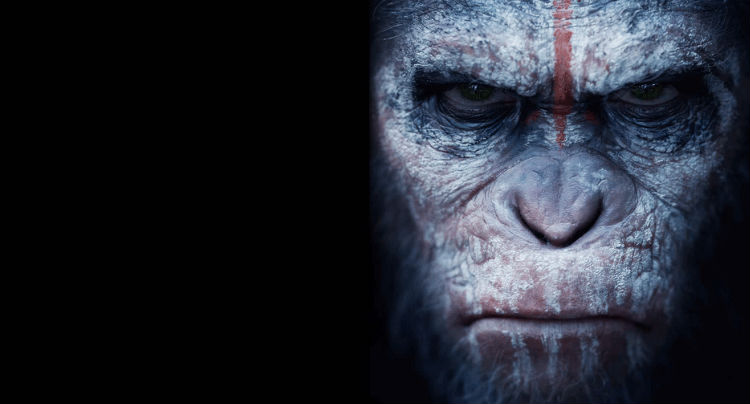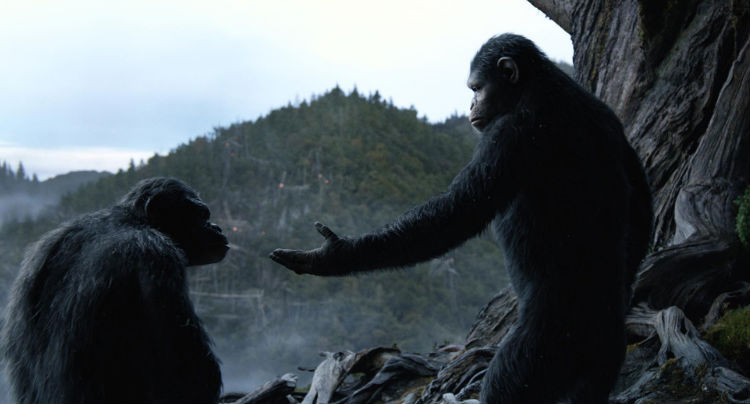
In the end, Dawn is about the virtue of empathy, and only by giving both the humans and apes a fair shake does the message pervade. Also: apes on horses shooting guns.

In the end, Dawn is about the virtue of empathy, and only by giving both the humans and apes a fair shake does the message pervade. Also: apes on horses shooting guns.
If you, like millions of others, plan on heading into Dawn of the Planet of the Apes this weekend ready to gobble up yet another action-heavy summer mega movie, expect to get way more than you bargained for: Dawn is a sophisticated, emotional picture that explores complex themes with nuance and precision. The film asks that you keep your moral compass handy at all times, as quandaries of trust and loyalty are constantly in play. But don’t let the heavy stuff scare you away; there are enough apes riding horses, talking apes, apes swigging bottles of hard liquor, and apes driving army tanks to satiate even the hungriest Hollywood action junkies.
The Planet of the Apes series is no stranger to social commentary, with previous installments tackling difficult topics like racism and, in Dawn‘s excellent predecessor, Rise of the Planet of the Apes, animal cruelty and genetic experimentation. Here, director Matt Reeves examines the nature of war, (Let Me In) plotting out intimately the inception of a bloody conflict between man and ape.

In an opening sequence that resembles a very expensive version of the popular mobile “outbreak” game Plague Inc., we learn that, ten years after the events of Rise, the human race is dangerously close to eradication due to the spread of “Simian Flu”. In San Francisco lies a small pocket of humanity fighting for survival in a post-plague world where foliage-covered city streets and concrete buildings are being reclaimed by nature. They’re led by Dreyfus (Gary Oldman), a man devoted to human preservation, and the noble, intrepid Malcolm (Jason Clarke). On the other side of the Golden Gate Bridge (which served as a key human/ape battleground in Rise) is Caesar (played again by Andy Serkis via motion capture), who since the last movie has built a thriving community of fellow apes and led them to a harmonious existence, tucked away in the towering redwoods of Marin County. Back from the first film are Maurice, the affable voice of wisdom, and Koba, Caesar’s vengeful, human-hating second-in-command.
Caesar’s fallen in love, had a son, and developed the ability to speak English quite well. His verbal skills are put to good use when a small group of humans, led by Malcolm, accidentally wander into ape territory seeking a dam that could restore power to their struggling community. Separated from the group, a trigger-happy asshole (Kirk Acevedo) shoots a young ape named Ash, and the humans are quickly surrounded by the furious ape clan. Instead of ordering his followers to rip Malcolm and his party to shreds, Caesar instead shows mercy, and in a gravelly roar orders the trespassers to “GO!!!”
In a series of exquisitely plotted events, we see Malcolm and Caesar attempt to cooperate and quell the rising tensions between their respective parties. Fueled by fear, jealousy, paranoia, and obsession, the barrier of peace breaks down, and violence erupts. In hindsight, the chess moves and character trajectories are all crystal clear, but in the moment, nothing is obvious or distractingly predictable. That’s because the film is too smart for that. The decision by Reeves and his writers to put good and bad people on both sides of the conflict is thoughtful and gives the film real emotional richness. In the end, Dawn is about the virtue of empathy, and only by giving both the humans and apes a fair shake does the message pervade.

The Transformers films would be leagues better if only Optimus and the Autobots were the main protagonists instead of the human characters. In this respect, Dawn is a treasure, as Caesar (a CGI creation, mind you) and the apes are given center stage. The beauty of the special effects that bring Caesar to life is that they disappear almost immediately. Once we’re convinced that what we see on screen is a living, breathing, talking ape, Serkis is free to do his real work. His performance is stunning and astonishingly intimate: while the Transformers are all about spectacle and fireworks, the apes are all about mannerisms, emotion, and communication. In a late scene between Caesar and his son, whose ideals clash throughout the film, the two share a poignant, tearful reconciliation, shot in close-up by Reeves. Not for a second are the visual effects unconvincing, nor the scene not entirely gripping.
Both Clarke and Oldman are on-the-money, and Keri Russell is likable as Malcolm’s wife, though unfortunately her role is so thinly drawn and disposable it escapes the mind quickly after leaving the theater. The tidal wave of action in the film’s final act is rightly ridiculous at times (is anything more ridiculous than an ape riding a horse, brandishing machine guns in both hands?) and totally thrilling. (The rest of the film ratchets the stakes up so sky high that it had to be so.) A more lurid depiction of war would have benefited the film greatly (most kills are either off-screen or obscured by distance), but the grand set pieces are far from disappointing.
Dawn of the Planet of the Apes is better than its predecessor, and that’s saying a lot. Though it juggles multiple characters struggling with inner conflicts inside of a larger external conflict, the film never feels unstable, confusing, or lopsided. It’s a surprisingly depressing movie, especially for a summer blockbuster, as it reveals the ugliest facets of human nature and the dire consequences they bear. However, the film feels alive, with moments of exhilaration, levity, and surprise that offset the dark, heady themes and lead it to a tonal sweet-spot that few big-budget films have the consideration to aspire to. Hail Caesar!